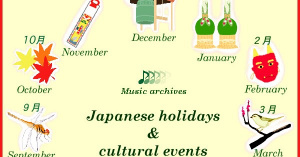Difference between revisions of "Language/Japanese/Culture/Public-Holidays"
(Page creation) |
|||
| Line 1: | Line 1: | ||
[[File:culture map Japan.JPG|thumb|none]] | |||
Each country has national event days. Here are the japanese ones. | Each country has national event days. Here are the japanese ones. | ||
Revision as of 19:45, 27 May 2018
Each country has national event days. Here are the japanese ones.
1st of January : It is the New Year's Day, called Ganjitsu, 元日. It is first day of the year according to the rest of the world, independant of the japanese calendar.
It is traditional to go to the temple with family to pray on this day.
Golden Week : It is a traditional 3-day off row from
Silver week : It is a neologism, refering to the annual Golden Week. As the spring has a consecutive vacation days in a row, autumn sometimes has a break of days off.
But it also refers to the first day of the vacation, Respect for the Aged Day, Keirō no Hi, 敬老の日, as their hair look like silver.
It doesn't occur yearly. Here is the calendar of following Silver Weeks incoming :
- September 19 – September 23: 2009, 2015, 2026, 2037, 2043, 2054, 2071, 2099
- September 18 – September 22: 2032, 2049, 2060, 2077, 2088, 2094
The Japanese law sttipulates that if there is only one open day between to national day, the open day could become a holiday too, to make and bridge.
That's why, in 2015 19 and 20 were Saturday and Sunday, so weekend the 21st was holiday and 23rd too. So, 22nd became holiday and people got a 5-day row vacation.
Festival but not holidays :
February 3rd : Setsubun, 節分. It is celebrate really early but refers to the spring festival. This day is based on the lunar calendar. The meaning is throwing beans to chase the evil-spirits out of the houses.
Work in progress...
